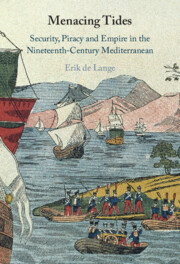Conclusion
Published online by Cambridge University Press: 11 April 2024
Summary
The creation of a new order of security in the Mediterranean revolved around shared conceptions of threat and a common apparatus of cooperative repressive practices. This conclusion explains how the repression of ‘Barbary piracy’, which European contemporaries perceived as one of the most urgent and persistent threats to security, was used to bring significant changes to the traditional diplomatic and maritime practices of the Mediterranean region. In fact, the fight against this imputed piratical threat fostered new ideas of the Mediterranean as a regional whole that could be rendered secure through policing efforts and imperial interventions. As a result, the political appearance of the Mediterranean Sea and its shorelines changed profoundly between 1815 and the closing years of the 1850s, when the Mediterranean seemed perfectly secure from piratical threats.
Keywords
- Type
- Chapter
- Information
- Menacing TidesSecurity, Piracy and Empire in the Nineteenth-Century Mediterranean, pp. 293 - 307Publisher: Cambridge University PressPrint publication year: 2024

